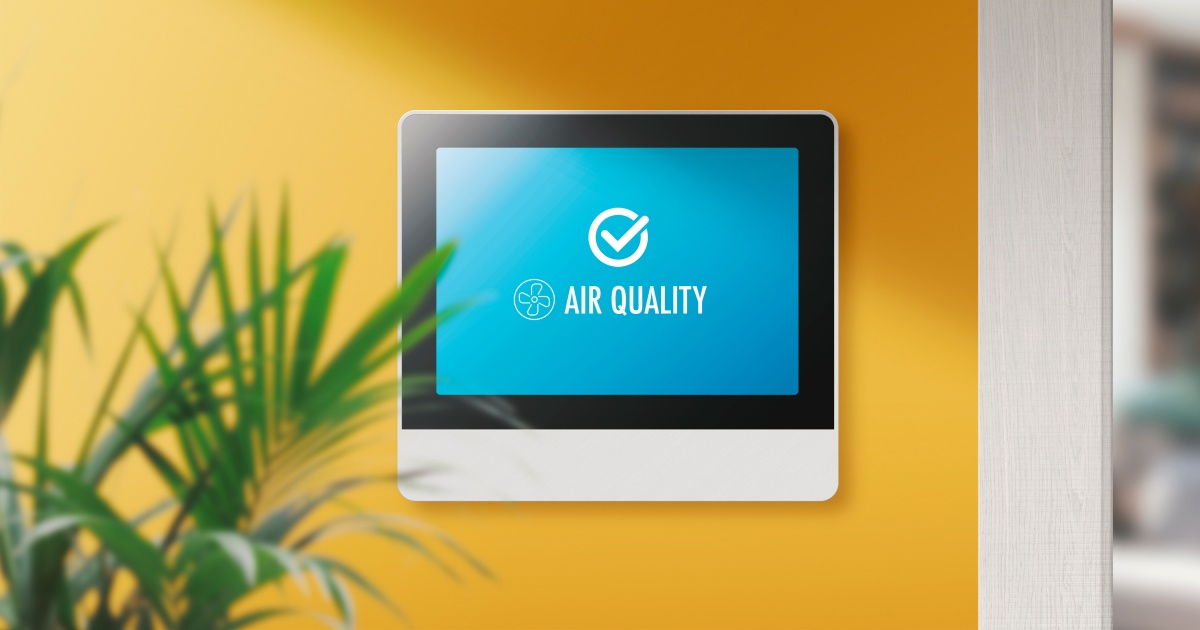
In recent years, pollutant concentrations have increased due to a lack of ventilation and the extensive use of synthetic materials in both residential and commercial buildings that hinder air exchange, certain occupant behaviors, and chemicals used in personal products. This has made it essential for enterprises to prioritize their indoor air quality (IAQ), as post-pandemic, workers have made their personal health a point of emphasis when deciding on an enterprise to work for.
Fortunately, there is a vast array of innovative technologies available that can help organizations improve their IAQ, especially when harnessed in unison with other devices and applications. The combination of artificial intelligence (AI) and the Internet of Things (IoT) is one such duo that can provide enterprises with the tools necessary to upgrade their IAQ.
Between AI’s real-time, enhanced data analytics capabilities, and the IoT’s ability to connect a variety of devices within an environment, enterprises can monitor such factors related to IAQ, like temperature, humidity, and ventilation, as well as certain microbes and particles. Once this data is generated, enterprises can even use AI to optimize facets such as predictive air conditions and current airflow within a given space.
Recently, Veea Inc., a leader in integrated smart edge connectivity, computing, and security technologies for edge and cloud, and WYND, a provider of comprehensive indoor air monitoring, environmental analytics, and air purification solutions, have deployed an AI-powered edge solution combining VeeaHubs, mesh networking, and distributed multi-location monitoring and control applications with WYND Halo IAQ Monitor and WYND Max medical grade air purifiers.
The partnership creates an award-winning duo, as Veea recently announced it received the IoT Product Excellence Award from TMC and Crossfire Media for the range of VeeaHubs, while WYND recently announced it received the 2023 Innovation Award from the Consumer Electronics Show (CES) organization for their AI-powered air quality products.
The solution has already been installed in a number of U.S. locations operated by Lincoln Property Company, a global, full-service real estate firm and Top 10 manager and developer of office, industrial, retail, and mixed-use properties.
“Keeping the indoor air environment healthy is the most important lever to reducing disease spread, but air is invisible, so it’s hard to tell whether the environment is good or bad as well as how to improve,” said Ray Wu, CEO of WYND. “WYND’s Halo air monitoring solution, along with cloud analytics (airIQ), enables comprehensive and proactive management of spaces for healthy and productive employees and guests. There is also a need to balance bringing healthy air with not wasting energy from systems like the HVAC when it’s not needed.”
WYND Technologies supports the solution with its advanced clean air measurement and remediation technologies and devices. The Veea Edge Platform provides the local edge mesh network, which collects the data from the WYND Halo indoor air quality monitors, and performs the local processing for interpreting, managing, reporting, and presenting the information collected. The Veea Edge Platform also provides a wireless 4G WAN uplink to the cloud for remote reporting, alerts and notifications, and archiving.
Multiple locations can be connected to the Veea Cloud for highly efficient remote monitoring, management, alerting, data collection, and analytics with a unique distributed solution that can be implemented in a matter of days in an economically efficient manner.
“Our strategic partnership with Veea enables the modern, smart building to automate air operations and enable healthier spaces while saving energy at the same time. Veea enables the insights from WYND’s Indoor Air Quality monitors to transform into HVAC and other device controls to remediate detected issues automatically,” continued Wu.
Veea tapped WYND based on the quality and performance of their equipment and embedded, AI-enriched software and connected multiple air monitoring and purification devices using VeeaHubs and vMesh edge networking software and Veea Control Center to provide a fully automated and always-on air quality monitoring and purification system.
“Following the pandemic, air quality became an immediate and pressing priority for property owners and property management companies,” said Mark Tubinis, Chief Commercial Officer for Veea. “Together with WYND, and in concert with property owners and management companies, we have developed and perfected a full-stack solution unlike any other in the market today. The WYND-driven air quality solution is one of a range of smart building applications that run on Veea’s in-building digital infrastructure, which leverages edge computing for real-time automation and instant alerting based on specific criterion.”
The solution is part of a broader set of Veea’s Environmental, Social and Governance as-a-Service (ESGaaS) solutions, powered at the edge by VeeaHubs providing a unified solution across multiple edge devices, accessories, and peripherals. This solution leverages the combination of the Niagara building management open framework integrated with the Veea Platform and data analytics capabilities to bring robust, comprehensive, and market-leading solutions to the market. These solutions provide direct, secure, and scalable control of building environments and associated operational costs.
“Whether conserving energy through smart lighting, detecting water leaks before they cause major damage, supporting safer spaces through connected and remotely controlled key systems, or remediating germs, pollen, smog, and harmful pollutants in the air, with our partners Veea is leading the market in smart building technologies,” stated Tubinis.
The global Indoor Air Quality Solutions market size was $38.5 billion in 2021 and is expected to reach $ 55.8 billion by 2028, growing at a CAGR of 5.4 percent over the time period. However, as more AI-enabled solutions emerge, enterprises will increasingly take the chance to improve their IAQ for the benefit of the employee’s health and well-being.
Veea and WYND will be demonstrating the solution at the AHR Expo next week, which runs from Monday, February 6, to Thursday, February 8, at the Georgia World Congress Center in Booth B375.
Arti Loftus is an experienced Information Technology specialist with a demonstrated history of working in the research, writing, and editing industry with many published articles under her belt.Edited by
Erik Linask





